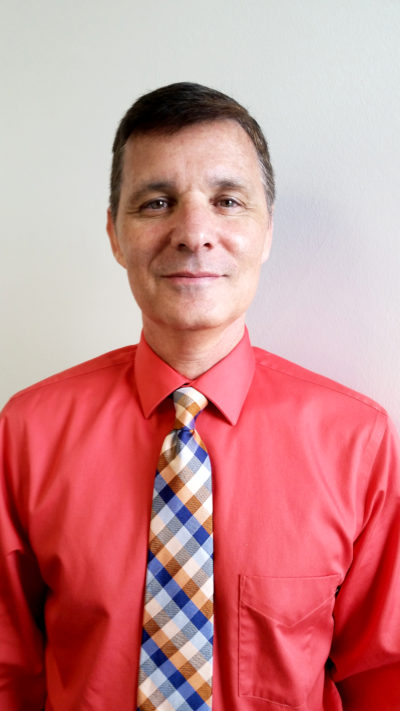
AIDS Foundation Houston Names John Huckaby as its New CEO
The not-so-newcomer has been associated with the org since the early '90s.

A familiar face has assumed the helm at AIDS Foundation Houston (AFH). John Huckaby recently accepted the title of CEO, after having been associated with the organization since the early ’90s. He took this leadership position after a stint with the American Red Cross in Houston and Tulsa, Oklahoma.
“The opportunity to come home to AIDS Foundation Houston brought me back. I have watched this organization grow [over the years],” he says. “I remember the people who have worked here, the thousands of volunteers, the people who show up for the annual AIDS Walks and AIDS Luncheons. Their courage always inspired me, and it was a great joy to come home and serve this great organization when I saw the opportunity.”
Huckaby’s initial desire to get involved with the nonprofit stemmed from his experiences at a young age. He cites his family’s values as a large component of his passion for community service.
“Our parents instilled in us a sense of social responsibility—caring for one another, and a sense of looking beyond ourselves to the needs of the greater community. We were taught to see our lives as a sense of vocation—a calling to do good,” Huckaby explains.
He also recalls the AIDS-related death of a family member, and reading the obituaries of deceased Texans, as factors in his calling.
“We grew up in the age of the trauma and crisis of HIV/AIDS, and I remember all the pioneers who inspired me, and feeling the need to be a part of this effort. I wanted to fight this disease and bring dignity to the people who suffered, and I still feel strongly about that today,” he says.
Huckaby first started working at AFH as a case manager handling direct client care. He says he would meet people in their homes and help them navigate their needs. “I helped put together a plan of care for them to live their best lives, until the end of their lives. That was the great majority of what we did in the late ’80s and ’90s, when HIV/AIDS progressed quite rapidly and people died quickly,” he said.
Since then, his job responsibilities within AFH have shifted as treatments—and the needs of HIV/AIDS-affected communities—have evolved. “Some things have changed, and some things have remained the same. We have medicines today that have the ability to help people [who are at risk for] HIV to remain free from the virus. PrEP is easy to take and adhere to [as prevention] therapy. With the advances in social media, we have new ways of reaching out to target populations that we didn’t have 30 years ago,” he says. “We have advancements in the treatment of HIV itself so that patients can achieve undetectability. If [the virus is] undetectable, it’s not transmittable. This is a huge benefit in the fight.”
He added that one battle AFH still fights is the stigma of HIV, and the fear of getting tested and learning the result.
“Seventeen percent of people with HIV in Houston don’t know they have HIV, and that’s a huge concern for us,” he emphasizes.
With such a history at AFH, Huckaby has seen the changes throughout the years and has plans for guiding the organization in its mission to lead Houston to zero new infections.
From its humble beginnings, AFH has always been a grassroots organization that is supported and elevated by the LGBTQ community. Huckaby credits the group’s leaders and activists with making AFH what it is, and helping it to join the national conversation about the AIDS crisis.
“This is how we were founded, and we’ve never forgotten our roots,” he says.
Over the years, with its Ryan White CARE Act and other national funding, AFH has grown in its ability to further commit to AIDS prevention and client care. Robust programs include a variety of community-testing opportunities, a PrEP clinic, and targeted community intervention in the city and beyond. AFH has also bolstered its ability to provide supportive housing and wellness services for the area’s most vulnerable groups, which include people living in poverty, homeless populations, and the incarcerated.
Now that he is leading AFH, Huckaby looks to the future with even sharper focus and drive.
“First of all, we want to ensure that our prevention teams have all the resources they need as they go out into the community and conduct outreach programs to provide testing and [promote PrEP treatment] for people who need it, and to make sure we are partnering,” he says. “Partnerships are key. I see us partnering closely with the community and [its healthcare] providers so that we are offering all the wrap-around care to make sure people remain in care. We want to be fully engaged with people who support us.”
He emphasizes that partnerships, especially within the LGBTQ community, are vital. “[AFH values] good partners in the LGBTQ community because we know where we have come from, and we know that support is so critical.”
In addition to the bridge-building that AFH fosters throughout the area, there’s one special partnership that keeps Huckaby going—the one with his lover, Sheng Chung, who is a professor of art education at the University of Houston. The Montrose residents enjoy gardening and the outdoors, traveling, the company of family, and the companionship of their dog, Baby Girl.
This article appears in the July 2019 edition of OutSmart Magazine.










